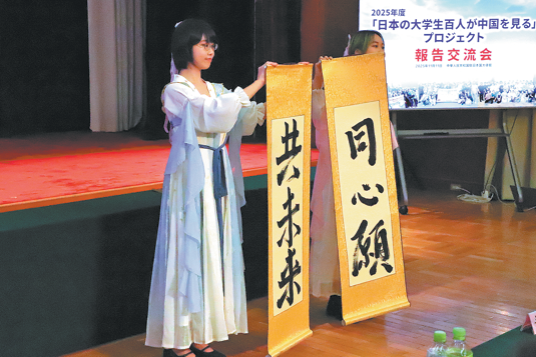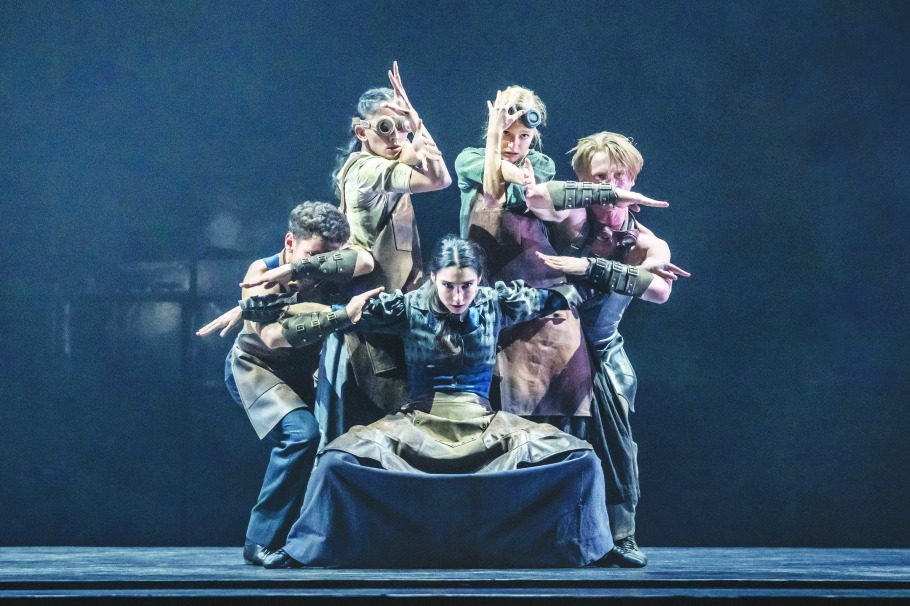Japanese students obtain firsthand insight in China


Japanese students who joined an exchange program to China said at an event in Tokyo on Tuesday that they gained a better understanding of how China balances modernization with cultural diversity.
Koharu Hayakawa, a student from Chuo University who spent a year studying in Tianjin, said he was impressed by how China preserves its heritage while developing tourism in historical villages.
During visits to Hongcun and Xidi villages in Huangshan, Anhui province, Hayakawa found that despite their popularity as tourist destinations, they retain a strong sense of everyday life. "They are truly living villages, not just tourist spots," he said, adding that the trip dispelled his earlier assumptions that such places were overly commercialized.
He also noted regional differences in lifestyle, cuisine and technology use, which gave him a deeper appreciation of China's diversity.
Launched last year, the "100 Japanese University Students Visiting China" program took this year's participants to Anhui in March, where they explored Mount Huangshan and Huizhou culture, and to Henan province in August, where they visited innovative companies, including Mixue Ice Cream and Tea. Both trips concluded in Shanghai, offering students the opportunity to experience life in one of China's most dynamic cities.
Reiji Nomachi, a student at Nihon University, said he was impressed by China's rapid technological advancements and urban modernization during his visit to Henan.
"What impressed me most was how deeply technology is integrated into everyday life in China," he said.
At electric vehicle maker BYD, Nomachi was surprised to see how affordable, fast-charging and long-lasting Chinese EVs have become. "The level of EV adoption in China is far ahead of Japan," he said, adding that it highlighted the country's speed of technological development.
The students agreed that firsthand experience is key to understanding China.
Hayakawa encouraged those who have visited to share their experiences with others. "By learning about daily life and culture in different regions, we can deepen understanding and contribute to friendly relations between Japan and China," he said.
Nomachi said that while Japanese media coverage of China can sometimes be negative, seeing the country in person gave him a more genuine and positive impression. He expressed hope that such exchange programs will enhance mutual understanding, reduce misconceptions and foster deeper communication between the two countries.
Otohiko Endo, head of the Japan-China New Century Association, said youth exchanges between Japan and China need fresh and creative perspectives.
Both countries face similar challenges such as aging populations, yet opportunities for young people to meet and interact directly remain limited, he said.
He urged the youth to face differences bravely and turn brief encounters into lasting relationships.
Zhao Baogang, minister counselor at the Chinese embassy in Tokyo, emphasized the importance of firsthand experience.
This year marks the 80th anniversary of the victory in the Chinese People's War of Resistance Against Japanese Aggression (1931-45) and the World Anti-Fascist War. Despite media speculation about possible "anti-Japanese sentiment", students visiting Henan and Shanghai encountered true friendliness and genuine warmth from the Chinese people.
Zhao said Japan and China have shared countless cultural legacies over more than 2,000 years of interaction. He expressed hope that young people will continue this tradition to strengthen bilateral relations.
Since its launch, the program has arranged four tours to China, with most participants being Japanese university students.
Sun Ran, editor-in-chief of Live Japan and head of the visiting delegation, announced that a youth friendship association will be established for the program.
"This long-term platform will allow past participants and their friends to continue exchanging ideas, helping the seeds of friendship and mutual understanding take root and grow," she said.
houjunjie@chinadaily.com































